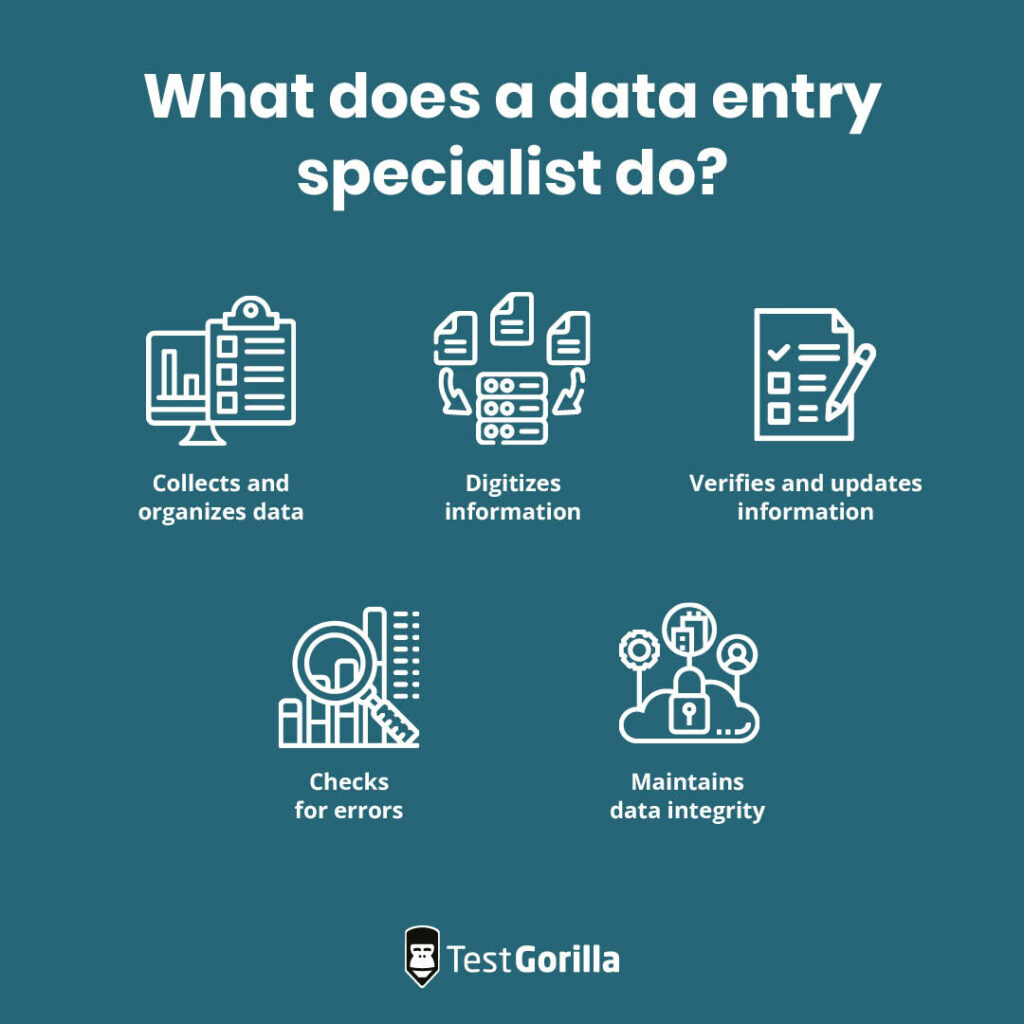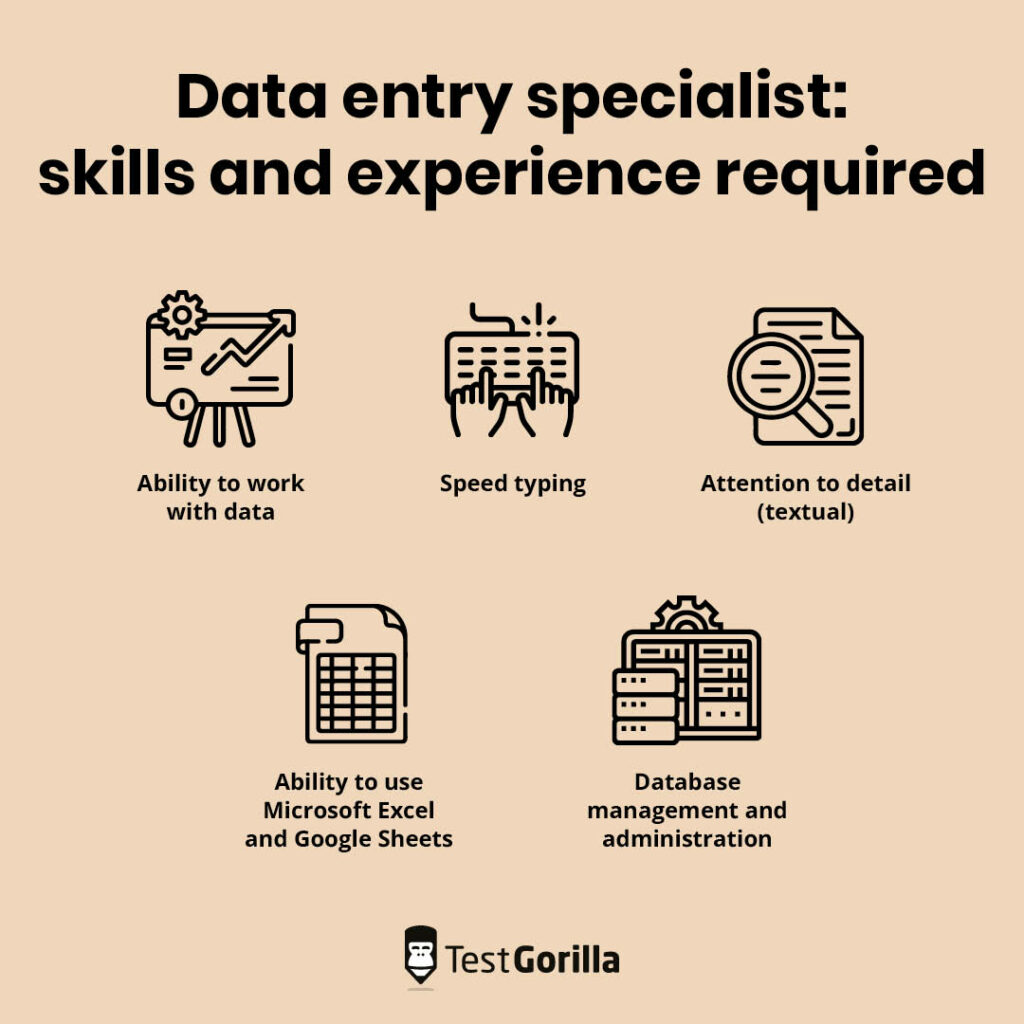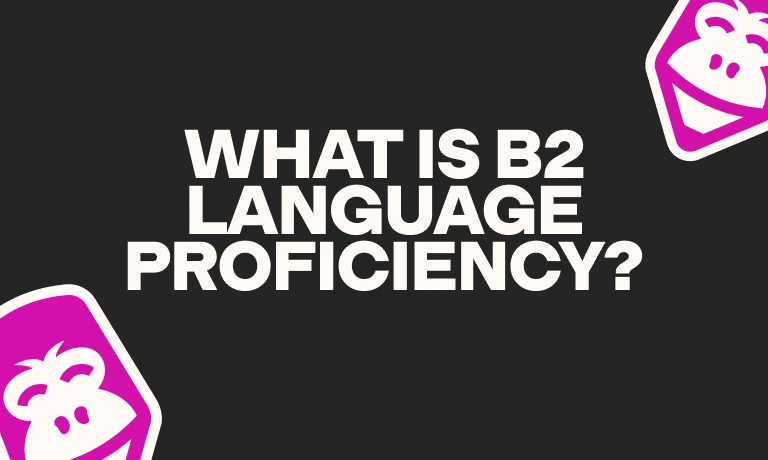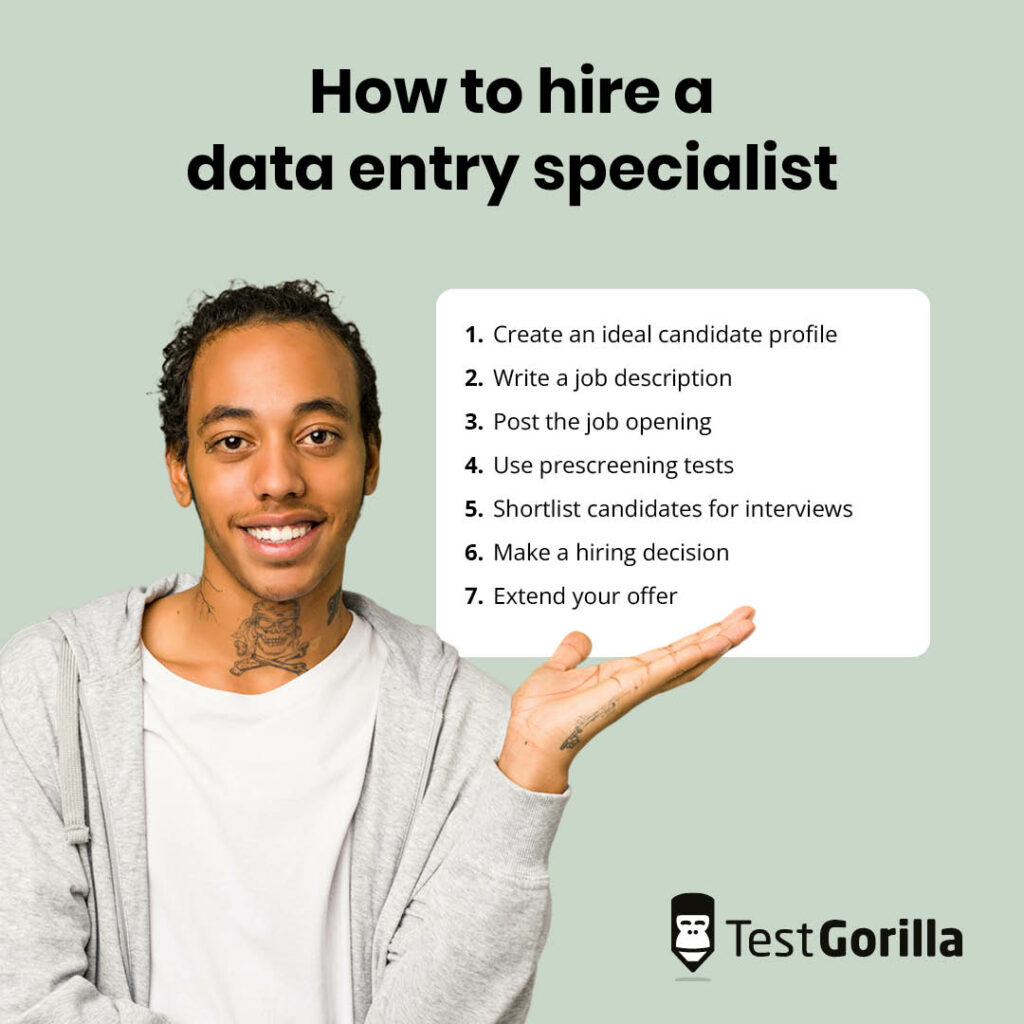How to hire a data entry specialist: Tips and a step-by-step guide
As your business grows, the data you collect will grow as well.
This includes customer contact information, sales data, inventory lists, medical records, financial data, and so on. Although it’s easier for small businesses to handle data entry, the larger your organization becomes, the harder it gets to keep track of all your data. And if you’re not careful, you might find yourself overwhelmed before you know it.
Before things get out of hand, you need to find and hire a data entry specialist who will take care of all that information, enabling you to spend your time on more productive endeavors.
A data entry specialist is a professional who is responsible for inputting information into computer databases, spreadsheets, and other digital formats.
Data entry specialists require good typing skills, attention to detail, and the ability to enter data quickly and accurately. They also need a solid knowledge of spreadsheet applications like Microsoft Excel and Google Sheets.
In this article, we explore what a data entry specialist is and what they do, their skills, and how to find and hire a data entry specialist for your organization.
What is a data entry specialist?
As mentioned, a data entry specialist is a professional who is in charge of entering and organizing data from different sources and preparing it for other teams to process. The data entry specialist role is typically part of an organization’s administrative team.
Data entry specialists will save you time, money, and resources (especially if they work remotely) by making your business more efficient. This enables you to focus on what matters the most: growing your company and earning more revenue.
Here are three main reasons to consider hiring a data entry specialist to help your organization get more done while saving on costs:
Improve time management and organization
As your business grows, you’ll need to start focusing on more important, higher-level tasks, like expanding your clientele, finding investors, and ultimately scaling the company to new heights.
However, the larger your organization becomes, the more information you’ll collect. All of this data will need to be filed and organized, which is a time-consuming process. This is why it’s more efficient to delegate the task to a data entry specialist.
Obtain useful data quickly
Although data entry may sound simple enough for anyone to do, it actually requires skills that not many people possess.
A good data entry specialist knows how to optimize the process so that your business doesn’t get swamped with data as it grows. In addition, they make it easier for you to find the exact information you’re searching for by organizing data in line with your company’s procedures.
Worth the investment
Data entry specialists typically earn between $29,700 and $49,740 per year, depending on the industry. For many companies, this is a small investment that can quickly pay for itself, considering the burden data entry specialists can lift from the rest of your team.
What does a data entry specialist do?
Now that you know what a data entry specialist is and what you can earn by investing in one, it’s time to go over the exact duties this professional performs.
The main responsibilities of a data entry specialist are accurately entering data into a system, verifying it, and maintaining its integrity. Data entry specialists may work for a wide range of industries, including healthcare, finance, retail, and more.
Here’s a rundown of their exact duties:
Collecting and organizing data: Data entry specialists collect data from surveys, online forms, and sales transactions and organize it into databases to make it easy for other team members to use. They can also transcribe audio files into readable documents for ease of use.
Digitizing information: Even though everyone is on a computer these days, a lot of information still comes in the form of hard copies. Data entry specialists extract and digitize that information to make it accessible to everyone on the team.
Verifying and updating information: Information becomes outdated over time, so data entry specialists need to update and verify that information.
Checking for errors: Data entry specialists must constantly double-check data to identify and correct any double entries, incorrect names, typos, and other errors.
Maintaining data integrity: Your spreadsheets might become corrupt over time, your system might catch a virus, or you might simply delete something by mistake. Around 29% of data loss is caused by accidents and mistakes, and 30% of computers are already infected with malware. Your data entry specialist will prepare for these issues by maintaining backup copies of all of your organization’s information.
The best insights on HR and recruitment, delivered to your inbox.
Biweekly updates. No spam. Unsubscribe any time.
What skills and experience does a data entry specialist require?
A good data entry specialist should possess several key abilities. If you’re looking to hire one, TestGorilla can support your pre-employment screening process by enabling you to easily evaluate these skills and sift through unqualified candidates.
Here are the skills you should be looking for:
Ability to work with data: Your data entry specialist must be able to work with datasets. TestGorilla’s Working with Data test evaluates a candidate’s ability to handle data correctly, use graphs and charts, and perform basic data analyses.
Speed typing: Data entry specialists should be able to write as many words per minute as possible to work quickly and efficiently. TestGorilla has three speed typing tests you can use based on your needs:
Attention to detail (textual): The textual attention to detail test assesses a candidate’s ability to process and compare written information, check for inconsistencies, and notice errors.
Ability to use Microsoft Excel and Google Sheets: The Google Sheets test and the Excel skills test assess a candidate’s familiarity with spreadsheet programs and their ability to use the software’s numerical, text, and logic functions. Two billion people worldwide use either Google Sheets or Excel, so having someone who knows how to operate this widely used software is a great advantage.
Database management and administration: The ability to administer, store, and access the information you require is crucial for every data entry specialist. The Database Management and Administration test will evaluate a candidate’s abilities to manage and review databases and ensure their security and integrity.
How to hire a data entry specialist
Finding and hiring the right data entry specialist for your company can be an easy task if you know how to do it right. Follow the steps below to make your hiring process a walk in the park.
Create an ideal candidate profile
Start by creating an ideal candidate profile.
What type of person are you looking for? Although you need someone with the relevant skills for the job, you also want to find a candidate who is an ideal culture add for your team.
In addition, think about what this person will do and whether they’ll need to come into the office or work remotely. If they need to work in an office, do you have the right hardware and office space for them, or do they need to bring their own laptop and share a desk with a colleague?
Would you prefer to hire an entry-level data specialist whom you’ll need to train but won’t require as high of pay? Or do you want someone with experience who can start in the role immediately but expects higher remuneration?
Answering these questions will enable you to write a better job description and find the right candidate.
Write a job description
Writing an engaging job description is key to finding the perfect applicants.
Usually, your job description should include the following:
Job title
Job description
Duties
Pay
Benefits
Qualifications
Start by stating the job title, and outline what the job will entail.
Then, identify the role’s main duties, like data entry, speed typing, digitizing information, and handling customer orders once they enter your system. If you’re using any specific software applications, include them in your job description as well.
Next, specify remuneration, perks, and benefits and whether candidates must commute or park near the office. Anything that can make the position more appealing is worth mentioning.
Finally, add the qualifications the candidate should have to apply for the job.
Post the job opening
Once you’ve prepared your job description, it’s time to post it online.
Advertise the job opening on your website and social media, especially LinkedIn. You can also attend job fairs or conferences to attract potential candidates.
The more places you advertise the role, the higher engagement you’ll have, and the more candidates will apply.
Use prescreening tests
As soon as applications start coming, you can start screening them and disqualifying anyone who doesn’t have the right skills or credentials.
Though resumes tell you the candidate’s side of the story, the only way to determine if they are actually qualified for the position is by using pre-employment tests. As mentioned above, TestGorilla offers a variety of tests you can use to evaluate applicants’ skills.
Make sure to give your entire applicant pool a skills assessment to determine who is most worth your time to interview.
Shortlist candidates for interviews
The candidates who scored the highest on the pre-employment tests are the ones you should invite for an interview. Use the interviews to identify candidates’ weak points and make a judgment of their character.
Although someone may be an excellent data entry specialist, if they’re not the right fit for your team, you’ll still end up with a bad hire that will cost you time and money. Statistics show that the average cost of a bad hire is 30% of the employee’s annual salary.
Avoid mis-hires by asking non-technical questions to get to know the person in front of you, be it face-to-face or via a video call.
Make a hiring decision
After conducting interviews, you should be left with one or two applicants who show great potential. Ideally, they will be highly skilled and knowledgeable and be a great fit for your team.
At this point, you’ll need to rely on your expertise as a recruiter to hire the right person. Take some time to review the candidates’ test results and interview answers and make a decision. Don’t be hasty when making your choice. After all, you may be working with this person for a long time, so you should ensure you select the one that most suits your team and organization.
Extend your offer
Once you’ve made your choice, extend an offer.
Congratulate the applicant and ensure they are ready to start working with you. You can start their onboarding process immediately to keep them engaged, help them learn the ropes of the company quickly, and prepare them to start working as soon as possible.
Hire a data entry specialist easily with TestGorilla
As your company grows, you’ll have much more information to deal with. Eventually, you’ll need a data entry specialist to handle all that data and free up time for your team to work on other tasks.
A good data entry specialist knows how to work with datasets and speed type to do their job efficiently and save you time and money in the long run. You can rest assured that by using pre-employment tests like those offered by TestGorilla, you’ll land a top candidate in no time.
If you’re unsure how pre-employment testing works, you can sign up for free or book a 30-minute live demo with one of our consultants to learn more about our platform. Choose TestGorilla, and find a data entry specialist who fits your company’s needs.
You've scrolled this far
Why not try TestGorilla for free, and see what happens when you put skills first.

















